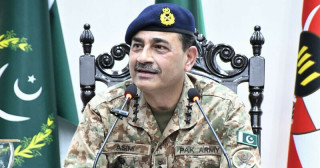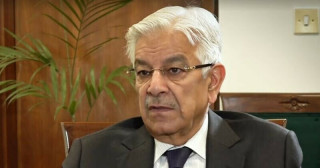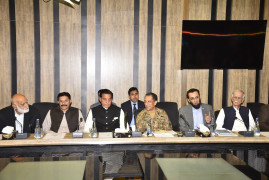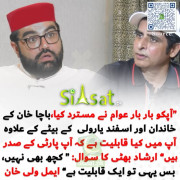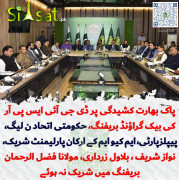Dunkin Donut
Senator (1k+ posts)
Ayesha Siddiqa (Urdu: عائِشہ صِدّیقہ ), (born April 7, 1966), is a Pakistani military scientist, a political commentator and an author who serves as a research associate at the SOAS South Asia Institute.[1][2] She previously served as the inaugural Pakistan Fellow at the Woodrow Wilson Center between 2004 and 2005.[3][4]
Born in Lahore, Siddiqa studied at Kinnaird College and went on to join the Civil Service of Pakistan. As a civil servant, Siddiqa served as the Director of Naval Research with the Pakistan Navy, making her the first civilian and the first woman to work at that position in Pakistan's defence establishment. She also worked in military accounts and as Deputy Director Defense Services Audit. Siddiqa moved to London, where she received her doctorate from King's College London in war studies.[5][6] After leaving the civil service, she served as the senior research fellow at the Sandia National Laboratories and went on to teach at the University of Pennsylvania, Johns Hopkins University and the Quaid-e-Azam University.[7][8] She also served as the Charles Wallace Fellow at St Antony's College, Oxford in 2015.[9][10]
She has written extensively on the Pakistan military, and her research has covered issues varying from the Pakistan military's covert development of military technology, defensive game theory, nuclear deterrence, arms procurement and arms production, to civil-military relations in Pakistan.[11] After leaving the bureaucracy, she authored Pakistan's Arms Procurement and Military Buildup, 1979-99: In Search of a Policy, 2001, and later, in 2007, published her critically acclaimed book: Military Inc.: Inside Pakistan's Military Economy. She also regularly writes critical columns for English language newspapers, including Dawn, Daily Times, The Friday Times and Express Tribune.[12][13]

What prompted Gen Bajwa to Dump DG ISI Gen Asim Munir in mere 8 Months
...shortest ever tenure is ISI history!

New ISI chief Faiz Hameed a manipulator picked by army chief Bajwa to be his master’s voice
Pakistan Army replaced its ISI head within 8 months with an ‘average’ officer close to chief Bajwa, whose hold in country’s politics grows by day.
AYESHA SIDDIQA Updated: 21 June, 2019 4:12 pm IST
The Pakistan Army’s strategic intelligence agency, the Inter-Services Intelligence, got a new chief this week, Lt General Faiz Hameed, making the world wonder what has he done to deserve the position. Or what will now be the fate of one of the most talked about intelligence agencies in the world.
Lt Gen. Faiz Hameed, the new Inter-Services Intelligence (ISI) chief, has raised eyebrows not due to his appointment but because he replaced Lt Gen. Asim Munir, who was appointed just eight months ago. This creates an impression that Faiz Hameed brings more to his boss’s table than his immediate predecessor. The change has ensured for him the title of being ‘his master’s voice’ and the fact that this will have an impact on the politics inside the organisation for the short to medium term.
There were times during Pakistan’s life as a frontline state for the United States when every new army chief would make observers wonder if the new man in was religiously conservative or had liberal tendencies. Notwithstanding that such line of questioning was incorrect, it was inspired by the idea that the army chief during the 1980s, Zia-ul-Haq, had changed the mood of the army. Using Zia-ul-Haq as a cultural-organisational milestone diverted observers away from the reality that the army, like a good armed bureaucracy, may change its outlook depending on the top boss but would remain focused on its strategic goals.
Also read: Washington to London: An inside account of how Pakistan’s deep state grooms ISI mouthpieces
Thus, a new head of the ISI will not or cannot tamper with its strategic goals. He will not interact with the jihadis on his own or eliminate them because he doesn’t agree with the idea. However, his relationship with the army chief, the ISI and the rest of the army will have an impact on his ability to perform. We know that the former head of the ISI, Lt Gen. (retd) Shamsur Rahman Kallu was outwitted by his organisation and kept out of the information loop because his organisation did not trust him. Kallu was appointed to the position by then Prime Minister Benazir Bhutto, who used her powers to appoint the ISI chief to bring in her own man and replace the hawkish Lt Gen. Hamid Gul.
Past & present, in Bajwa’s company
Lt Gen. Faiz Hameed’s relationship with Pakistan Army chief General Qamar Javed Bajwa date back to the early to mid-2010s, when the former was a brigadier and posted as Chief of Staff at the Rawalpindi based 10th Corps where Bajwa was the field commander officer. Both Bajwa and Hameed belong to the Baluch regiment. Subsequently, Hameed was promoted as major general and sent to 16th infantry division at Pannu Aqil, which experts believe belie the fact that he was viewed by the army under Raheel Sharif as an average officer who was not given the better 12, 11, and 10 infantry divisions at the same station.
After completing the command of a division, which is one of the prerequisites of for promotion to the rank of a three-star appointment, Hameed was brought back to Rawalpindi. But Qamar Bajwa, who had taken over the command of the army by then, brought his own man to head the ‘C’ wing of the ISI responsible for counter-intelligence, which means a hand on the political pulse of Pakistan and on the organisational pulse of its army. Indeed, Hameed grew so powerful in that position that many viewed him as the main man running the ISI and not Lt Gen. Naveed Mukhtar, who served as the DG ISI from December 2016 to October 2018. However, Hameed couldn’t be made the head as he was still short of a third star, which he earned in April 2019 and was posted as the Adjutant-General. This is another powerful position within the GHQ hierarchy, especially in terms of contact with the army chief.
Also read: New ISI chief Hameed headed Pakistan’s internal security & is close to army chief Bajwa
General Hameed could have continued as Adjutant-General had Bajwa not gotten restless and brought him back to the ISI — this time as the top boss of the spy agency to replace Lt Gen. Asim Munir, who has been shunted off to a less illustrious position as the Corps Commander Gujranwala. The shift will certainly leave a mark on the relationship between the army’s spy organisation, Military Intelligence – which is where Asim Munir had come from – and the ISI.
Not so average ambitions
Faiz Hameed may be counted as an average officer but he is certainly a man with above average personal ambitions. A three-year stint at the ISI means he would have his hand on the organisational pulse to ensure that he remains in the run for the position of the army chief in the future, depending on when Bajwa decides to doff his uniform. Bajwa’s influence leaped further last week when he was included as a member in Prime Minister Imran Khan’s newly created body for Pakistan’s economic revival – the National Development Council. Though many observers claim that Bajwa will retire from his position of army chief in November this year, Bajwa himself had voiced his intent to stay on for at least another year to his counterparts in the United Kingdom during a visit in October 2018.
Sources claim that Faiz Hameed qualifies to be in the run if Bajwa gets either a one-year or a three-year extension. In fact, many say that Faiz Hameed has ensured that when it is the turn for his name to be considered, Asim Munir would not qualify for the same due to some critical, though minor, manipulation of his service record. Meanwhile, he will serve his boss in the army, carefully monitoring the impact that an extension may have on the organisation and its corporate ethos. Bajwa’s staying on will have an effect on the careers of 24 lieutenant generals and numerous major generals. The domino effect of Bajwa’s decision will enhance the internal pressure inside the organisation. The level of resentment and the fallback will have to be calculated and minimised.
Also read: Pakistan’s new ISI chief was accused of secretly helping Imran Khan’s party in 2018 polls
General Bajwa seems to be consistently working on his image as a man with a grand plan to create a new country with a cleaner system of governance. In a recent corps commander’s conference, General Bajwa thundered: ‘mein kisi ko nahin chhorun ga’ (I will not spare anyone). The issue here is not just the ‘corrupt’ civilian, which is how the popular narrative goes, but also men in uniform. Bajwa recently sentenced a three-star lieutenant general to 14 years of rigorous imprisonment and death to a one-star brigadier and a scientist for leaking the country’s nuclear secrets for money. This, in an army that has tried to insulate itself from corruption allegations through instituting an extensive system of perks and privileges for its men, especially the higher echelons. The story of Lt Gen. (retd) Javed Iqbal and Retired Brigadier Raja Rizwan speaks of the breaking down of the business-as-usual method.
A death sentence to its officers is certainly a rarity, which may have become imperative considering that Raja Rizwan is accused of sharing secrets with India’s Research & Analysis Wing (RAW). The Lt Gen., on the other hand, was possibly linked with the US effort to locate Pakistan’s strategic assets, particularly after Washington DC grew fearful of militants succeeding in hurting the strategic chain-of-command for decision-making. There was resentment in the military, especially the segments considered as the ‘deep state’, regarding Gen Pervez Musharraf’s closeness with the Americans. The metallurgist responsible for building Pakistan’s nuclear enrichment program, Dr Abdul Qadeer Khan recently filed a petition in the Lahore High Court accusing Musharraf of colluding with the US in forcing him to publicly take responsibility for selling nuclear secrets to Libya, Iran and North Korea.
Reading this news along with the earlier one indicates the worry that there are elements within the Pakistan Army that may be involved in trading secrets with foreign agencies. There are reports of over a dozen officers being investigated in relation with the earlier-mentioned case. Chief Qamar Bajwa could always build a case for securing his own institution against irresponsible behaviour.
PTI, the important task
Lt. General Faiz Hameed is certainly no Asad Durrani or Hamid Gul. At best, he is what General Ahmed Shuja Pasha was for his boss, General Kiyani. More than military matters, Faiz Hameed’s greater worth lies in domestic political manipulation, something that he has already proven to do. The role he played in building the 2017 protest of the Tehreek-e-Labbaik Pakistan (TLP) to weaken the Nawaz Sharif government, and later manipulating a peace deal with the Barelvi militants, was criticised by the Supreme Court. As the head of ISI, Faiz Hameed would ensure that the new political mechanism namely the PTI survives, and the political influence of the opposition parties is managed well, especially at a time when the risk to Prime Minister Imran Khan can become formidable due to economic pressures the public faces.
Also read: Espionage case shatters Pakistan army’s myths – and the belief its nuke secrets are secure
One of Lt Gen. Faiz Hameed’s important tasks would be to ensure that the political pot doesn’t boil over into the streets. This would call for management of resources within the political party system, and generating sufficient amount of fear in the larger civil society to curb any popular political movement emerging, especially in Punjab. According to one keen observer of Pakistan’s security, there will certainly be more news of ‘mysterious deaths’ in the country.
The other significant players with whom the new ISI chief would have to keep the conversation going are the jihadi groups that are under pressure because of the nature of geo-politics at the moment. While the Financial Action Task Force (FATF) is a current reality, conditions could change in case of an Iran-US conflagration. Obviously, in those circumstances, the situation will change not just for the jihadis but for the Pakistan military in general. For the moment, Faiz Hameed is in good company with the interior minister, Brigadier (retd) Ijaz Shah, who has links with all kinds of jihadis – from al-Qaida and Lashkar-e-Taiba to Jaish-e-Mohammed and the Taliban – to keep the conversation with the militants going.
Perhaps, the biggest impact of this appointment will be on the future of Pakistan Army as an institution. If indeed the purpose is to build up and ensure prolongation of General Bajwa’s career, as was done by his predecessor General Kiyani, it points to a shift in the organisational ethos. With every army chief considering himself indispensable, the only result is the eventual weakening of the organisation.
https://theprint.in/opinion/new-isi...y-chief-bajwa-to-be-his-masters-voice/252683/
Born in Lahore, Siddiqa studied at Kinnaird College and went on to join the Civil Service of Pakistan. As a civil servant, Siddiqa served as the Director of Naval Research with the Pakistan Navy, making her the first civilian and the first woman to work at that position in Pakistan's defence establishment. She also worked in military accounts and as Deputy Director Defense Services Audit. Siddiqa moved to London, where she received her doctorate from King's College London in war studies.[5][6] After leaving the civil service, she served as the senior research fellow at the Sandia National Laboratories and went on to teach at the University of Pennsylvania, Johns Hopkins University and the Quaid-e-Azam University.[7][8] She also served as the Charles Wallace Fellow at St Antony's College, Oxford in 2015.[9][10]
She has written extensively on the Pakistan military, and her research has covered issues varying from the Pakistan military's covert development of military technology, defensive game theory, nuclear deterrence, arms procurement and arms production, to civil-military relations in Pakistan.[11] After leaving the bureaucracy, she authored Pakistan's Arms Procurement and Military Buildup, 1979-99: In Search of a Policy, 2001, and later, in 2007, published her critically acclaimed book: Military Inc.: Inside Pakistan's Military Economy. She also regularly writes critical columns for English language newspapers, including Dawn, Daily Times, The Friday Times and Express Tribune.[12][13]

What prompted Gen Bajwa to Dump DG ISI Gen Asim Munir in mere 8 Months
...shortest ever tenure is ISI history!

New ISI chief Faiz Hameed a manipulator picked by army chief Bajwa to be his master’s voice
Pakistan Army replaced its ISI head within 8 months with an ‘average’ officer close to chief Bajwa, whose hold in country’s politics grows by day.
AYESHA SIDDIQA Updated: 21 June, 2019 4:12 pm IST
The Pakistan Army’s strategic intelligence agency, the Inter-Services Intelligence, got a new chief this week, Lt General Faiz Hameed, making the world wonder what has he done to deserve the position. Or what will now be the fate of one of the most talked about intelligence agencies in the world.
Lt Gen. Faiz Hameed, the new Inter-Services Intelligence (ISI) chief, has raised eyebrows not due to his appointment but because he replaced Lt Gen. Asim Munir, who was appointed just eight months ago. This creates an impression that Faiz Hameed brings more to his boss’s table than his immediate predecessor. The change has ensured for him the title of being ‘his master’s voice’ and the fact that this will have an impact on the politics inside the organisation for the short to medium term.
There were times during Pakistan’s life as a frontline state for the United States when every new army chief would make observers wonder if the new man in was religiously conservative or had liberal tendencies. Notwithstanding that such line of questioning was incorrect, it was inspired by the idea that the army chief during the 1980s, Zia-ul-Haq, had changed the mood of the army. Using Zia-ul-Haq as a cultural-organisational milestone diverted observers away from the reality that the army, like a good armed bureaucracy, may change its outlook depending on the top boss but would remain focused on its strategic goals.
Also read: Washington to London: An inside account of how Pakistan’s deep state grooms ISI mouthpieces
Thus, a new head of the ISI will not or cannot tamper with its strategic goals. He will not interact with the jihadis on his own or eliminate them because he doesn’t agree with the idea. However, his relationship with the army chief, the ISI and the rest of the army will have an impact on his ability to perform. We know that the former head of the ISI, Lt Gen. (retd) Shamsur Rahman Kallu was outwitted by his organisation and kept out of the information loop because his organisation did not trust him. Kallu was appointed to the position by then Prime Minister Benazir Bhutto, who used her powers to appoint the ISI chief to bring in her own man and replace the hawkish Lt Gen. Hamid Gul.
Lt Gen. Faiz Hameed’s relationship with Pakistan Army chief General Qamar Javed Bajwa date back to the early to mid-2010s, when the former was a brigadier and posted as Chief of Staff at the Rawalpindi based 10th Corps where Bajwa was the field commander officer. Both Bajwa and Hameed belong to the Baluch regiment. Subsequently, Hameed was promoted as major general and sent to 16th infantry division at Pannu Aqil, which experts believe belie the fact that he was viewed by the army under Raheel Sharif as an average officer who was not given the better 12, 11, and 10 infantry divisions at the same station.
After completing the command of a division, which is one of the prerequisites of for promotion to the rank of a three-star appointment, Hameed was brought back to Rawalpindi. But Qamar Bajwa, who had taken over the command of the army by then, brought his own man to head the ‘C’ wing of the ISI responsible for counter-intelligence, which means a hand on the political pulse of Pakistan and on the organisational pulse of its army. Indeed, Hameed grew so powerful in that position that many viewed him as the main man running the ISI and not Lt Gen. Naveed Mukhtar, who served as the DG ISI from December 2016 to October 2018. However, Hameed couldn’t be made the head as he was still short of a third star, which he earned in April 2019 and was posted as the Adjutant-General. This is another powerful position within the GHQ hierarchy, especially in terms of contact with the army chief.
Also read: New ISI chief Hameed headed Pakistan’s internal security & is close to army chief Bajwa
General Hameed could have continued as Adjutant-General had Bajwa not gotten restless and brought him back to the ISI — this time as the top boss of the spy agency to replace Lt Gen. Asim Munir, who has been shunted off to a less illustrious position as the Corps Commander Gujranwala. The shift will certainly leave a mark on the relationship between the army’s spy organisation, Military Intelligence – which is where Asim Munir had come from – and the ISI.
Not so average ambitions
Faiz Hameed may be counted as an average officer but he is certainly a man with above average personal ambitions. A three-year stint at the ISI means he would have his hand on the organisational pulse to ensure that he remains in the run for the position of the army chief in the future, depending on when Bajwa decides to doff his uniform. Bajwa’s influence leaped further last week when he was included as a member in Prime Minister Imran Khan’s newly created body for Pakistan’s economic revival – the National Development Council. Though many observers claim that Bajwa will retire from his position of army chief in November this year, Bajwa himself had voiced his intent to stay on for at least another year to his counterparts in the United Kingdom during a visit in October 2018.
Sources claim that Faiz Hameed qualifies to be in the run if Bajwa gets either a one-year or a three-year extension. In fact, many say that Faiz Hameed has ensured that when it is the turn for his name to be considered, Asim Munir would not qualify for the same due to some critical, though minor, manipulation of his service record. Meanwhile, he will serve his boss in the army, carefully monitoring the impact that an extension may have on the organisation and its corporate ethos. Bajwa’s staying on will have an effect on the careers of 24 lieutenant generals and numerous major generals. The domino effect of Bajwa’s decision will enhance the internal pressure inside the organisation. The level of resentment and the fallback will have to be calculated and minimised.
Also read: Pakistan’s new ISI chief was accused of secretly helping Imran Khan’s party in 2018 polls
General Bajwa seems to be consistently working on his image as a man with a grand plan to create a new country with a cleaner system of governance. In a recent corps commander’s conference, General Bajwa thundered: ‘mein kisi ko nahin chhorun ga’ (I will not spare anyone). The issue here is not just the ‘corrupt’ civilian, which is how the popular narrative goes, but also men in uniform. Bajwa recently sentenced a three-star lieutenant general to 14 years of rigorous imprisonment and death to a one-star brigadier and a scientist for leaking the country’s nuclear secrets for money. This, in an army that has tried to insulate itself from corruption allegations through instituting an extensive system of perks and privileges for its men, especially the higher echelons. The story of Lt Gen. (retd) Javed Iqbal and Retired Brigadier Raja Rizwan speaks of the breaking down of the business-as-usual method.
Reading this news along with the earlier one indicates the worry that there are elements within the Pakistan Army that may be involved in trading secrets with foreign agencies. There are reports of over a dozen officers being investigated in relation with the earlier-mentioned case. Chief Qamar Bajwa could always build a case for securing his own institution against irresponsible behaviour.
PTI, the important task
Lt. General Faiz Hameed is certainly no Asad Durrani or Hamid Gul. At best, he is what General Ahmed Shuja Pasha was for his boss, General Kiyani. More than military matters, Faiz Hameed’s greater worth lies in domestic political manipulation, something that he has already proven to do. The role he played in building the 2017 protest of the Tehreek-e-Labbaik Pakistan (TLP) to weaken the Nawaz Sharif government, and later manipulating a peace deal with the Barelvi militants, was criticised by the Supreme Court. As the head of ISI, Faiz Hameed would ensure that the new political mechanism namely the PTI survives, and the political influence of the opposition parties is managed well, especially at a time when the risk to Prime Minister Imran Khan can become formidable due to economic pressures the public faces.
Also read: Espionage case shatters Pakistan army’s myths – and the belief its nuke secrets are secure
One of Lt Gen. Faiz Hameed’s important tasks would be to ensure that the political pot doesn’t boil over into the streets. This would call for management of resources within the political party system, and generating sufficient amount of fear in the larger civil society to curb any popular political movement emerging, especially in Punjab. According to one keen observer of Pakistan’s security, there will certainly be more news of ‘mysterious deaths’ in the country.
The other significant players with whom the new ISI chief would have to keep the conversation going are the jihadi groups that are under pressure because of the nature of geo-politics at the moment. While the Financial Action Task Force (FATF) is a current reality, conditions could change in case of an Iran-US conflagration. Obviously, in those circumstances, the situation will change not just for the jihadis but for the Pakistan military in general. For the moment, Faiz Hameed is in good company with the interior minister, Brigadier (retd) Ijaz Shah, who has links with all kinds of jihadis – from al-Qaida and Lashkar-e-Taiba to Jaish-e-Mohammed and the Taliban – to keep the conversation with the militants going.
Perhaps, the biggest impact of this appointment will be on the future of Pakistan Army as an institution. If indeed the purpose is to build up and ensure prolongation of General Bajwa’s career, as was done by his predecessor General Kiyani, it points to a shift in the organisational ethos. With every army chief considering himself indispensable, the only result is the eventual weakening of the organisation.
https://theprint.in/opinion/new-isi...y-chief-bajwa-to-be-his-masters-voice/252683/
Last edited:


